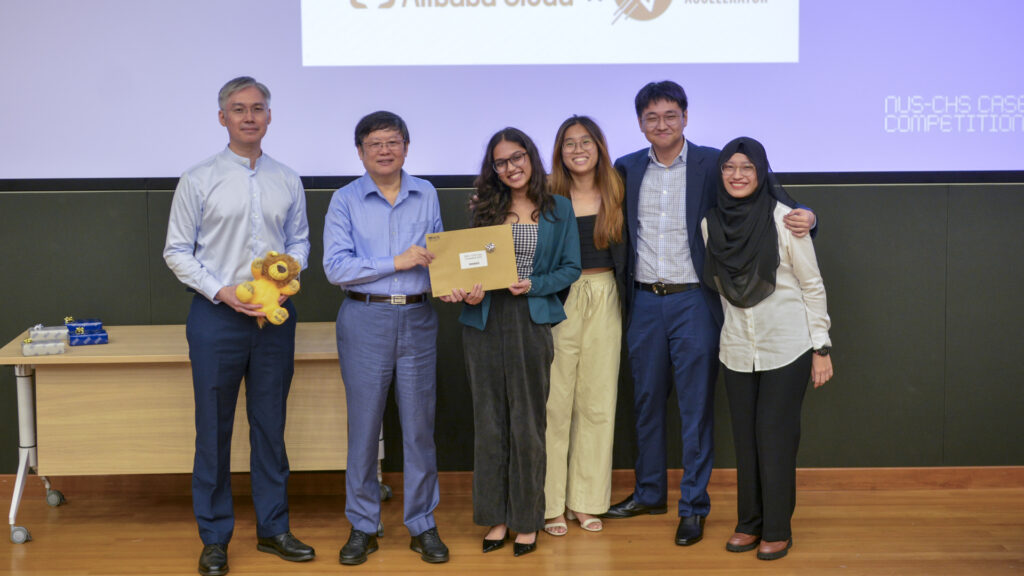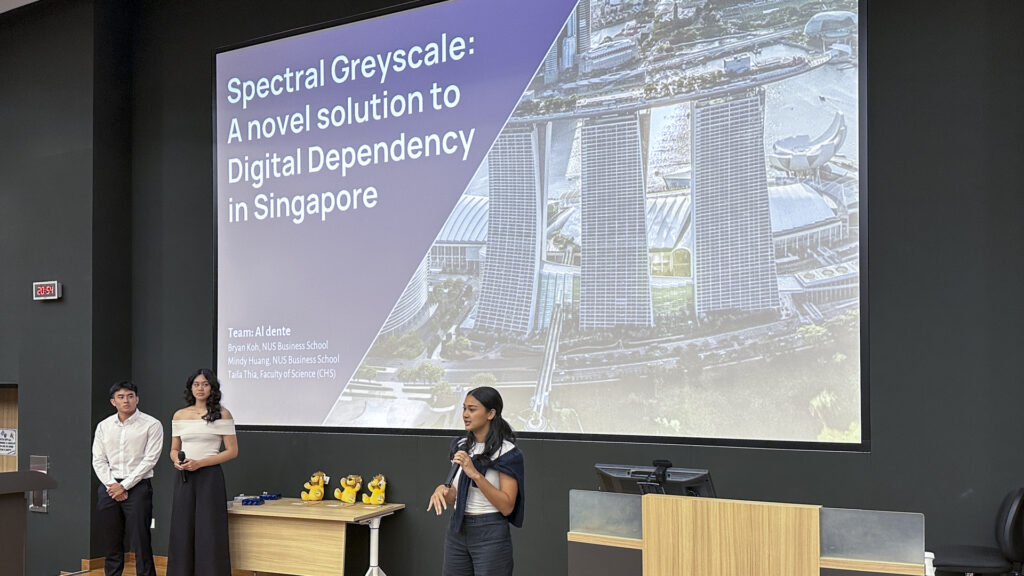2023 CHS Case Competition: Tackling Screen Dependency in the Age of Social Media
October 9, 2023
IN BRIEF | 5 min read
- Themed “Solutions for Tomorrow”, the third iteration of the competition saw 47 teams compete to devise the best solutions to screen dependency among Singaporean youth and adults. Conceptualised by the Dean’s Offices at the NUS Faculty of Science and NUS Faculty of Arts and Social Sciences (FASS), the competition’s unique features – an unlimited team size, the ability to change members during the competition and a Telegram group to facilitate team formations – were designed to simulate the way complex problems are tackled in the real world.

A national campaign to tackle screen dependency, a phone app that scrambles your other apps or an inbuilt phone setting that greys your screen when you spend too much time on social media – these were just some of the creative solutions proposed to counter the burgeoning social phenomenon of screen-related addictions at the recent NUS College of Humanities and Sciences Case Competition.
Themed “Solutions for Tomorrow”, the third iteration of the competition saw 47 teams compete to devise the best solutions to screen dependency among Singaporean youth and adults. Conceptualised by the Dean’s Offices at the NUS Faculty of Science and NUS Faculty of Arts and Social Sciences (FASS), the competition’s unique features – an unlimited team size, the ability to change members during the competition and a Telegram group to facilitate team formations – were designed to simulate the way complex problems are tackled in the real world.
“The CHS case competition is premised on the creation of innovative and workable solutions to complex real-world issues by drawing from the multidisciplinary expertise of team members,” CHS Co-Dean and Dean of the NUS Faculty of Science, Professor Sun Yeneng said. “This is an invaluable opportunity as students get to apply curriculum learning and adopt an interdisciplinary lens to problems, whilst also receiving mentoring and guidance from NUS faculty members and industry experts.”
Understanding the root of the problem
Screen dependency is becoming a worrying trend in recent times. Easy access to cyber technology over the last two decades has led to an unhealthy dependency on internet devices such as smartphones and computers. This was exacerbated by COVID-19 – the e-Conomy SEA 2020 report revealed that Singaporeans spend an average of 4.1 hours online daily, up from an average of 3.6 hours before the pandemic.

To give participants a deeper understanding of the problem they were tackling, a panel session on “Navigating the Digital Era – Technology Dependency” was organised at the launch event on 11 August, where business, technology and government representatives from EY and Infocomm Media Development Authority (IMDA) shared their insights on tech addiction and its impact on individuals, workplace demands to maintain productivity, and the lack of human-centric approaches to employees' mental health and wellbeing in technology adoption.
Teams were also mentored over two mid-term workshops delivered by faculty members from FASS and the NUS Centre for English Language Communication, who shared domain knowledge on digital dependency and provided guidance on communications and case writing skills.
Building on this foundational knowledge, the teams submitted essays offering potential solutions using a multitude of approaches including policy, technology and education, among others, and an impressive array of fun and out-of-the-box solutions resulted.
Panel judge and Head of NUS Business School’s Department of Management and Organisation Prof Sam Yam remarked, “It was a great event. The finalists all had innovative ideas to reduce social media addiction and the judges from the industries as well as academia were impressed. At the end, we chose three proposals that were innovative, practically feasible, and potentially scalable.”
Fun and feasible solutions for the win
Team Delulu won the top prize for their “Beta than Meta” campaign, an annual national campaign that comprises three phases: raising awareness of social media overuse, a detox challenge with friends and family, and incentives to stay away from screens in the form of recreational activities for campaign participants (sourced through partnerships with local small- and medium-sized enterprises). The campaign’s success leverages the psychological Theory of Planned Behaviour which assumes that individuals act rationally and according to their attitudes and subjective norms.

Second prize winner Team Al dente’s solution is “Spectral Greyscale” – an inbuilt phone setting that applies a monochromatic filter which mutes the visual experience for users after prolonged periods spent on social media and games, but rewards users for taking healthy breaks by restoring screens to full colour. The innovative, science-based solution was inspired by neuroscientific studies on the important influence of colour on capturing attention, prolonging attentive response and intensifying emotions compared to their monochromatic counterparts.
The third prize went to Team Apple Ecosystem whose “Scramble” mobile app allows users to personally define achievable targets on healthy screen times, scrambles the user’s apps on their screens when targets are exceeded, and offers in-app streaks and challenges as well as a forum for app users. The app is designed to encourage consistency in healthy screen behaviour while providing a support system for screen-dependent individuals.
The first, second and third cash prizes were worth S$1,500, S$1,000 and S$500 respectively. All finalist teams also received cloud computing credits and F&B vouchers from competition sponsors.
Associate Professor Nicholas Hon, FASS Vice Dean of External Relations and Student Life thanked all who participated. “We were overwhelmed by the response to the competition this year. It was created to promote an awareness of interdisciplinary thinking and interdisciplinary approaches to problem-solving. The fact that everyone who took part got a chance to practise this important skill means there are no losers in this competition.”
Tavisha Jain, Year 2 FASS Economics student, shared her team’s plans post-win, “Looking ahead, we are fully committed to taking the ‘Beta than Meta’ Campaign to the next level. Our objective is to make it a reality and transform it into a tangible initiative that nurtures a culture of digital well-being throughout Singapore.”
On her team’s biggest takeaway, she added, “This case competition has shown us that when a dedicated team comes together with a passion for change, remarkable things can happen. Witnessing the diverse ideas and approaches from other teams showcased the immense potential within our university community. We’ve learned the value of diverse perspectives and the significance of constructive feedback, which will undoubtedly fuel our future endeavours.”
This story first appeared in NUSnews on 9 October 2023.

